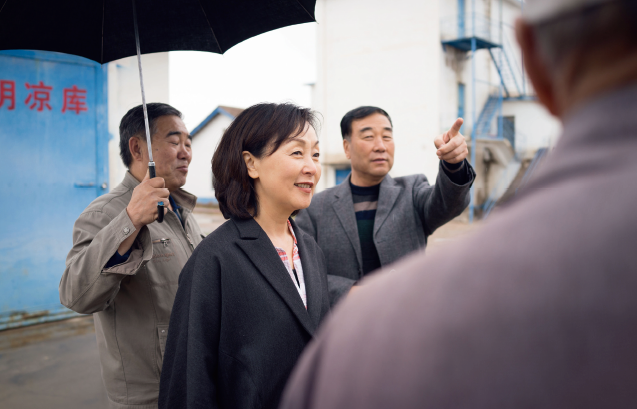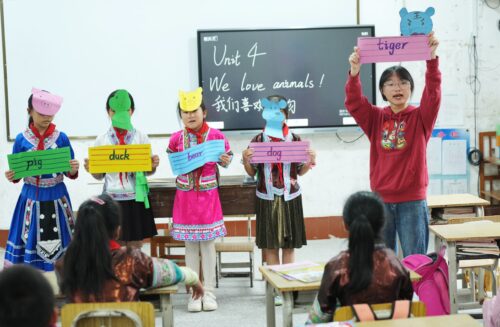Rural education and gender equity in China
“Gradually, I also realized that to achieve an education is only the first step of the journey toward women’s empowerment. They still face traditional expectations from family and society and still need the continued support of personal and career development,” says Ching Tien, Founder of Educating Girls of Rural China (EGRC).

We spoke with Ching Tien, Founder of Educating Girls of Rural China (EGRC), to discuss the landscape of education philanthropy in China and EGRC’s ongoing work to promote gender equality and women’s empowerment. (Interview has been edited for clarity and length).
Serica: What is EGRC’s mission and how did you become involved in the cause of educating girls?
Ching Tien: EGRC’s mission is to empower rural young women through education, provide opportunities for their personal and career development, and further identify and train a new generation of women leaders. The desire to found the organization was closely tied to my own personal journey and life experience. In China, due to political instability, I didn’t have the opportunity to finish my own education. I was sent to Gansu with my mother, where I worked in a factory for eight years.
My mother was a doctor and traveled to remote villages to treat people. She brought back stories that left an impression on me, particularly about how women and young girls were treated in the countryside. I immigrated to Canada and established a new life. Both of my children were born and raised in Canada with opportunities I didn’t have. Through an organization called Go Girls, I identified my belief that educating girls is the most important and fundamental cause: to lift people out of poverty and to build better societies. I went back to Gansu in 2005 with the idea of improving girls’ education and have continued to support this cause over the last fifteen years.
Serica: Education is an extremely strong area of philanthropic support in China, with over 40% of high net worth individual annual giving going towards education causes. What makes EGRC’s work different?
CT: Chinese people have an emphasis on education that has been embedded in thousands of years of Chinese culture. But China has not historically had as strong an awareness of girls’ education. Awareness of girls’ issues has increased after Malala in 2011, but especially when I started doing this work, China didn’t emphasize girls’ education, and I wasn’t personally aware of any other organizations doing this kind of work in China.
We are unlike other organizations that focus on education in China. We have a singular focus on rural women and girls and recognize that financially supporting them to receive an education is only the first part of our work. From the very beginning, I realized that they needed more than money; they needed emotional support to succeed and do well in school. I provided this kind of support by meeting them in person and finding out about their achievements, progress, and challenges. Recently, we started providing all students with more systematic training from mental health awareness to confidence building, as well as leadership and communication skills. Later on, when we had more students graduating, the girls bonded with each other, and because we had established these close ties, our relationship with them didn’t stop after they graduated. In 2014, we established an alumni association, and graduates have been a part of EGRC’s long-term development; many express a desire to mentor other high school students or give back to annual crowdfunding campaigns.
Gradually, I also realized that to achieve an education is only the first step of the journey toward women’s empowerment. They still face traditional expectations from family and society and still need the continued support of personal and career development. In 2019, I invited their parents to participate in the summer. Parents should understand more about their daughters, and my goal as a parent is to respect my grown-up children and their decisions and desires.
Serica: Have you noticed a shift over the years since EGRC’s founding of the role of Chinese philanthropists in promoting education both domestically and abroad?
CT: When I started doing this, ordinary Chinese were not really aware of what philanthropy was. The idea of not getting anything back from a donation didn’t make sense. This concept only became more widespread after the Sichuan earthquake in 2008. At that time, wealthy people had amassed a lot of wealth and wanted to do something with it. Though I don’t deny that people have a very sincere motivation to want to help, philanthropy in China has become quite fashionable in recent years. But there is still a fundamental misunderstanding about what true philanthropy is, and more education is needed.
Serica: Are any of the funds raised outside of Canada, and, if so, has there been support from Chinese-owned foundations or private philanthropists?
CT: Our donor base, from 2005 to 2010 was 100% Canadian. Long-time donors were local Chinese from Hong Kong. Most had left China to receive university education and training in Canada and had been in Canada for 30 or 40 years. This group of people was and still is especially concerned and loyal to our cause.
Since then, up until 2019, we’ve had more than half our funds raised in China. 100% of the donations in China were from expats who were working at international schools or different foreign organizations. They were close to the issue of rural girls’ education and wanted to give back to China after benefiting from economic growth there.
Serica: Covid-19 and the declining state of U.S.-China relations have had a profound impact on the philanthropic sector. What impacts have you seen on your programming and the ability to fundraise both domestically in Canada and abroad?
CT: In 2020 we engaged a big group of Chinese organizations and individuals for the first time. Because of the travel restrictions imposed during the pandemic, there have been fewer and fewer expats living in China, and so we’ve had to broaden our outreach. This has included increasingly more middle-class Chinese, some of whom were educated in the West and have chosen to return home during the pandemic. They wanted to give back but were having trouble finding a charity they could trust. Covid became an opportunity for us to tell our story and invite them on this journey with us.
Serica: President Xi Jinping recently declared that poverty has been eradicated in rural China. How do you still make the case for EGRC in the eyes of critics who claim that China is already a developed country with a strong economy of its own that doesn’t need foreign philanthropic aid to support its education sector?
CT: Nobody has brought that up. Donors who have donated for years have never raised that question. Poverty is relative, and though everyone has basic shelter and food, education is being funded with families taking out government loans. Living expenses for students are getting more expensive, and we have to subsidize tuition and accommodation.
Serica: Are there other organizations like EGRC that are doing positive work in this area, and what do you hope for the future of education in China?
CT: It’s hard to convey how much time and energy we spend with our students. To be honest, I haven’t seen any other organization make this amount of effort.
We follow-up with every single girl. I still meet every single girl every year. Our team members visit a few times a year and provide training, including training for the parents, as well as knowledge building. Every single girl has our contact information if they need help or encounter any difficulties. Our alumni network is 1500 girls, which is less than 100 girls a year, but to me each one of them counts. I want every single one to not only receive funding to achieve an education but to help them build confidence and find out what they really want to do in life. Going through the program is a big part of that. I want them to have an understanding of how to give and how to help others, so that eventually they can go out there and make a big difference.
To learn more about Educating Girls of Rural China (EGRC), please check out the student stories and alumni impact sections of their website, or watch their introductory video. A new book published in 2021 to celebrate the 15-year anniversary of the organization, featuring a selection of personal reflections and more striking images like the ones featured in this article, is also available for purchase on their website.
*
Want to learn more? The Serica Initiative’s China Philanthropy & Nonprofit Newsletter is a monthly deep-dive into the trends, major players, and regulatory environment for philanthropic and nonprofit activity between the U.S. and China. Subscribe to the newsletter here.






